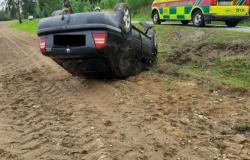What would you do if you suddenly found yourself locked in your own body, fully conscious, perceiving, feeling, but unable to make the slightest movement or tell anyone about your experiences? We can probably agree that the idea of something like that is a complete nightmare. A man named Martin Pistorius experienced exactly such a nightmare firsthand. As a result of a serious brain disease, he fell into a vegetative coma as a small boy and after regaining consciousness was subsequently stuck for many years in a condition known to modern medicine as “locked-in syndrome”, in Czech “locked-in syndrome”. This is a condition of a serious brain disorder in which the patient experiences complete paralysis of all volitional muscles (striated muscle) with the exception of most oculomotor muscles. The patient’s own body then becomes a prison – he perceives everything, but cannot express it.
Martin Pistorius lived with locked-in syndrome for twelve long years before he managed to break free from the reins of his own body.
Fatal brain disease
Martin Pistorius was born in 1975 in Johannesburg, South Africa. He was a perfectly healthy, bright boy whose childhood was not particularly different from that of other boys his age. He lived with his mother, father and two older siblings, spent the mornings at school, the afternoons running outside with his friends, and was obsessed with the hot new technology at the time – computers.
One day in 1987, he came home from school complaining of a sore throat. His mother took him to the doctor, who initially thought the boy had contracted the common flu. He therefore prescribed the usual treatment, which included drugs to reduce fever, sufficient fluid intake and bed rest, but little Martin did not get any relief. Over the course of a few days, it got worse, so he was hospitalized in the children’s ward of the local hospital, where he was given a more detailed examination. Tests showed that Martin suffers from two complicated conditions – cryptococcal meningitis (inflammation of the meninges caused by yeast) and cerebral tuberculosis. Although he immediately received the best available treatment for both identified ailments, his condition was very serious. It is still not known for sure whether the diagnosis at the time was correct, the treatment had almost no effect anyway. Martin’s body became so weak that he gradually lost the power to move his head and limbs, he was unable to feed himself and subsequently lost the ability to communicate verbally.
Photo: Nabaei G., Afhami S./Wikimedia Commons/Creative Commons Attribution 3.0
Inflammation of the meninges on magnetic resonance imaging
The doctors could no longer prevent what happened next. Martin was twelve years old when he fell into a so-called vegetative state (a form of waking coma). His body was unable to respond to any external stimulus and the boy lost consciousness. For the next three years, he was unconsciously blinking and moving his eyes.
Locked in his own body
Pistori’s parents were told by doctors that their child was gone. Martin survived in the same way that vegetables survive in the earth, without knowing that he was even alive. Even if the boy had regained consciousness, they argued, his condition would continue to be incompatible with life. The Pistoris should have put up with it, provided his body with care and comfort, and waited for his death, which, if merciful, would come soon.
Despite the negative prognosis, Martin survived the hospital stay and was discharged to home care. The parents took care of him as best they could, and when they couldn’t, they took their son to a day care center. Around Martin’s fifteenth birthday, something incredible happened. Without anyone around him noticing, he woke up. As his first memory from that time, he remembers how, somewhere high above him, strange voices are talking about whether they should shave him. He knew that everything had changed – he could perceive, feel, hear and see again. But none of that was cause for celebration for him at that moment. Since nothing was supposed to change in his physical abilities for many years to come, Martin was in for an ordeal worse than any other.
“I was like a ghost,” he said in his autobiography. “I saw and heard everything, but it was as if I wasn’t there. I was invisible.’
Everyone around Martin understandably acted as if he still didn’t notice, and this ignorance took on a particularly cruel dimension in this context. Martin experienced a state of complete powerlessness, where every single aspect of his life was decided and controlled by someone else completely without regard to his feelings and wishes. Someone else decided how warmly he would be dressed, in what position he would lie, what clothes he would be wearing. To this day, Martin still remembers how many times his nurses misjudged his current needs and he was unable to defend himself against them in any way. Clothes that were too warm or not warm enough, the sharp light of a lamp aimed directly at his face, an unpleasant program on television or perhaps an itchy tag on his T-shirt – all these seemingly small things could turn his life into a horror when he was forced to endure them for long hours of taste.
“I can’t even express how much I hate Barney,” Pistorius recalls today of the afternoons spent in front of the TV screen in the inpatient unit, where he had to watch children’s programs for endless hours Barney & Friends with the cartoon character of Barney the dinosaur.
Photo: Toby Churchill Ltd/Wikimedia Commons/Public Domain
People with speech disabilities use different types of communicators to communicate with their surroundings. Pictured here is a speech computer similar to the one used by Martin Pistorius
As a particularly bitter experience from that time, Martin mentions when his mother, in a moment of great strain and exhaustion, looked him straight in the eye and said:
“I hope you die soon.”
Her words resonated painfully in Martin for the next several years. He never resented her for them; he knew the tremendous dedication she took to care for the child who looked like a caricature of her beloved son. According to his own statement, she broke his heart then.
Deliverance
The turn of the millennium brought another big turn in Martin’s life – and this time for the better. One of his caregivers, a kind-hearted woman named Virna van der Walt, noticed that Martin was responding to what she was saying by moving his eyes and blinking. She arranged for him to undergo testing at the Center for Alternative and Augmentative Communication in Pretoria, where it was finally determined that Martin was not only fully perceptive, but that his cognitive abilities were at a very good level. Despite his mental development effectively being stuck at the twelve-year-old level, he manifested himself through the communicator as an intelligent young man. His parents also bought him a communicator at home, and Martin was able to talk to his loved ones for the first time in twelve long years. Although he had to relearn everything from reading to social skills to brushing his teeth, he grew stronger with so many new stimuli and experiences that he began to partially control his upper body. By 2015, he was able to move on his own in a wheelchair and even learned to drive a specially modified car with his own hands.
After half his life spent in total mental isolation, Martin decided not to waste another day and moved to the UK to live with his sister Kim. Here he studied computer science at university and met his future wife, Joanna. They married in 2009. He wrote a book about his bitter experience with locked-in syndrome, which was published in 2011 under the title “Ghost Boy”.
Today, Martin Pistorius enjoys the joys and sorrows of a quiet family life. He and his wife raise a small son, make a living as a programmer and web designer, and regularly share photos of their hard-won free life on their Instagram profile.

Photo: Anatoly Vyalikh/Wikimedia Commons/Creative Commons Attribution 3.0
Forum of the University of Hertfordshire, alma mater of Martin Pistorius
Robinson, Gregory: “Man who survived more than a decade in a coma woke up to tell a remarkable story” (15/1/2023) www.unilad.com. Read on 4/25/2024
PISTORIUS, Martin and LLOYD-DAVIES, Megan. Return from nothingness: the gripping story of a boy who became a prisoner of his own body. Translated by Jana JAŠOVÁ. Prague: Prague, 2016. ISBN 978-80-7252-647-5.
Withnall, Adam: “‘Ghost Boy’ Martin Pistorius who suffered mysterious virtual coma for 12 years describes hearing his mother tell him: ‘I hope you die'” 1/14/2015. The Independent. Read on 4/25/2024
Tags: Mom hoped die incredible story man spent childhood waking coma
-






